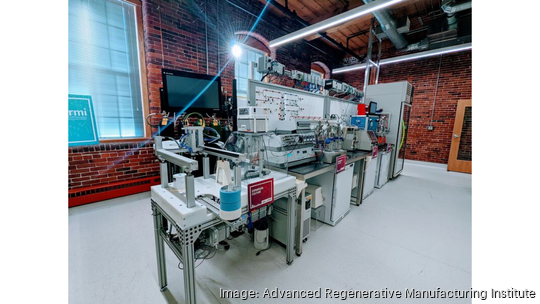
Four New England areas have received a first-of-its-kind designation as Regional Innovation and Technology Hubs from the Biden administration. Now, they will compete to be part of an even more select group to receive additional funding to bring to life their projects.
This month, 31 communities across the country were named tech hubs through authorization by the federal CHIPS and Science Act. The goal of these hubs is to drive investment in technologies critical to economic growth, like semiconductors, clean energy and quantum computing. Federal support to these hubs will hopefully make them global centers of innovation and lead to job creation.
Four tech hubs were named in New England spanning five states. They are the Ocean Tech Hub in Rhode Island and Massachusetts, the ReGen Valley Tech Hub in New Hampshire, the Advancing Gallium Nitride Tech Hub in Vermont and the Forest Bioproducts Advanced Manufacturing Tech Hub in Maine.
The White House said it selected the tech hubs from more than 370 applications. Nearly three-quarters of the selected hubs benefit small and rural areas and more than three-quarters support historically underserved communities.
Go inside New England’s hubs
In New Hampshire, the Advanced Regenerative Manufacturing Institute is leading the charge at the ReGen Valley Tech Hub. The institute wants to make New Hampshire a global leader in biofabrication, producing cost-effective regenerative therapies that address chronic disease and organ failure.
Jen MacDonald, chief operating officer at the institute, said they’re seeing more companies and startups looking to move to the region. She said when they were standing up their BioFab Startup Lab, before they’d even announced the program, they received triple the number of applications that it was able to support.
“We need the commercial capacity, we need the lab space, we need the wraparound services for our accelerator, and we need the community infrastructure, affordable housing, childcare,” MacDonald told BostInno. “We need those elements that will really make this a true hub and that’s what led us to chase the tech hubs opportunity.”
Further north in Maine, the Maine Technology Institute and its partners want the state to show off its natural resources.
Heather Johnson, commissioner of the Maine Department of Economic Community Development, said the world is looking for ways to replace fossil fuels and plastics in building materials and packaging. She sees Maine’s forestry industry as a big part of the solution. Maine received a Tech Hub designation for forest-based biomaterial production and manufacturing.
Johnson said as they further develop their tech hub application, they’ll be balancing ways to drive research and move this market forward, while also building commercial operations.
Matthew Touchette, director of public affairs for Rhode Island Commerce, called their designation a “boon to our momentum.” Rhode Island Commerce leads the Ocean Tech Hub covering Rhode Island and Southeastern Massachusetts.
The Ocean Tech Hub aims to build on the seaside region’s experience in ocean technology. Touchette said they want to take advantage of their seven commercial ports and shallow and deep ocean access to develop, test, and commercialize maritime artificial intelligence and machine learning-enabled robotics and sensors.
“While it doesn't yet come with the level of funds needed to build this globally competitive Hub, we plan to build on this momentum and begin serious planning and collaboration around the effort,” Touchette wrote in an email to BostInno. “Over the next few months, we'll be working with our partners to catalog the gaps in the region's assets towards building the workforce of the future, creating rapid commercialization programs, and surfacing ready-to-go opportunities in our public and private sectors.”
The University of Vermont did not respond to requests for comment on their tech hub designation for innovations in GaN manufacturing, a critical materials technology for wireless communication.
From idea to implementation
The 31 tech hubs announced this month are part of Phase 1 of this program. Now, the teams behind the hubs will spend the next few months applying for the Phase 2 Notice of Funding Opportunity.
In Phase 2, five to 10 of the tech hubs will receive implementation grants. Each of those hubs will receive approximately $40-$70 million across around three to eight projects.
Even those hubs not chose in Phase 2 get certain benefits, according to the U.S. Economic Development Administration, including higher consideration for other relevant Economic Development Administration funding opportunities.
Sign up for The Beat, BostInno’s free daily innovation newsletter from BostInno reporter Hannah Green. See past examples here.








